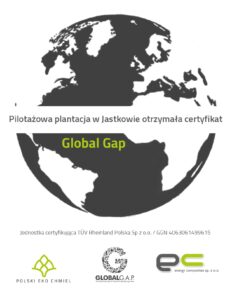As a result of using creosote oil to impregnate the supporting structure of hops, it is common to contaminate hop plantations (soil and cones) with polycyclic aromatic hydrocarbons (PAHs). Since April 2018, creosote oil has been banned in the European Union for impregnating wood due to its highly carcinogenic effect.
Nearly 100% of hop plantations use wooden load-bearing structures impregnated with creosote oil. For decades, the soil where hops are grown has accumulated carcinogenic PAHs from this impregnation.
The entire hop industry will have to replace the wooden poles of the hop-bearing structure and remediate the soil to eliminate PAHs from the soil.
Hops are primarily a food plant. The European Union tightens the safety standards for PAHs in relation to food products exposed to polycyclic aromatic hydrocarbons.
Polski Eko Chmiel S.A. - as the only one in the world - it is a supplier of a comprehensive system of technologically advanced composite supporting structures of hops with a unique technology of monitoring and increasing the efficiency of hop cultivation in an environment free of creosote and carcinogenic PAHs.
We will also offer biological remediation of land where hops are grown, restoring the soil condition to the recommended standards.
We also grow hops on plantations not contaminated with PAHs as part of integrated production, and in the next stage, EKO, on an environmentally neutral composite supporting structure of hops. As a result, we become a unique producer of high-quality hops free from PAHs and pesticides. Our strategy also includes the cultivation of the most desirable hop varieties in craft and home brewing, which are currently lacking on the market.
We run a socially responsible business.
HAVE QUESTIONS?
Be sure to use our contact form





